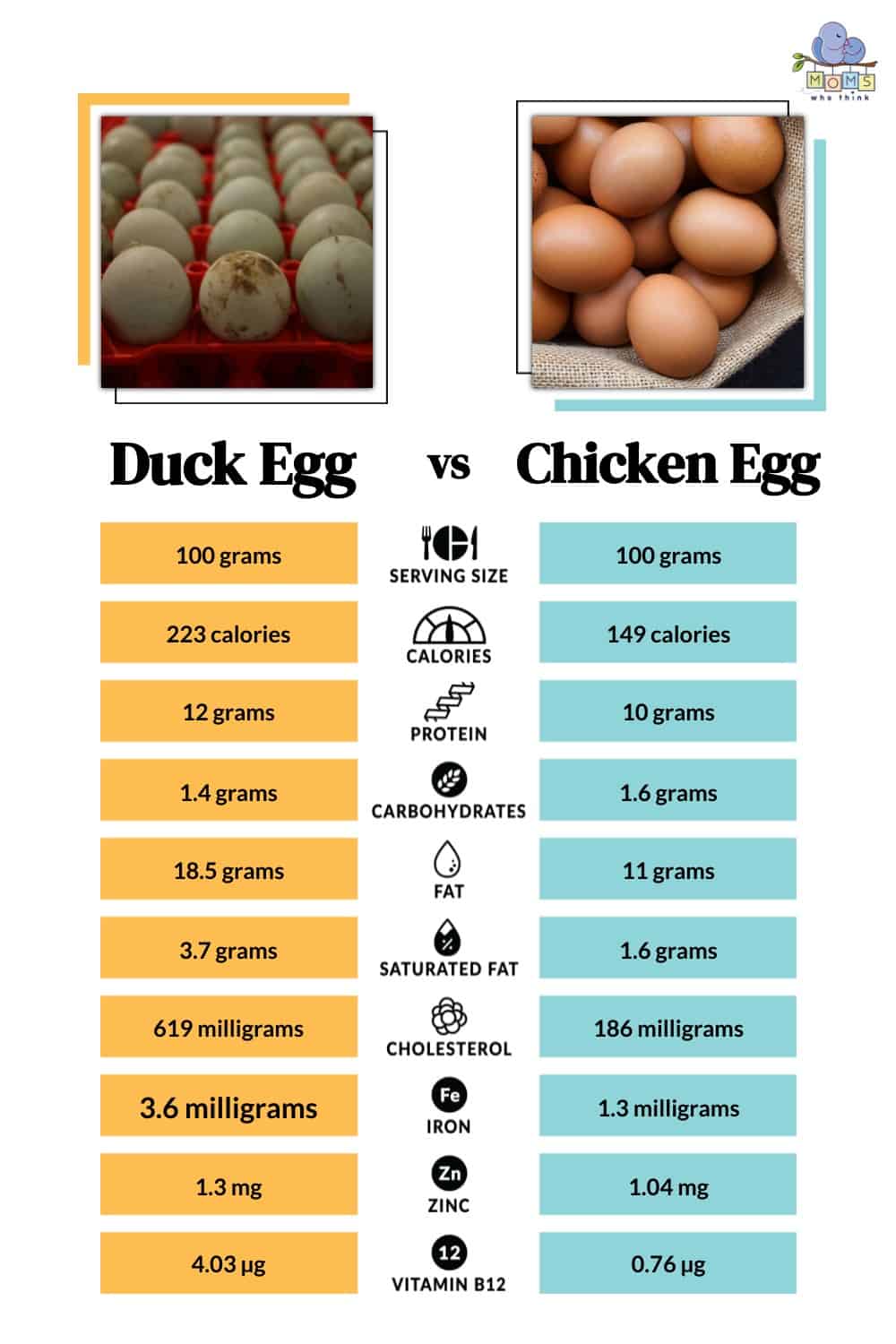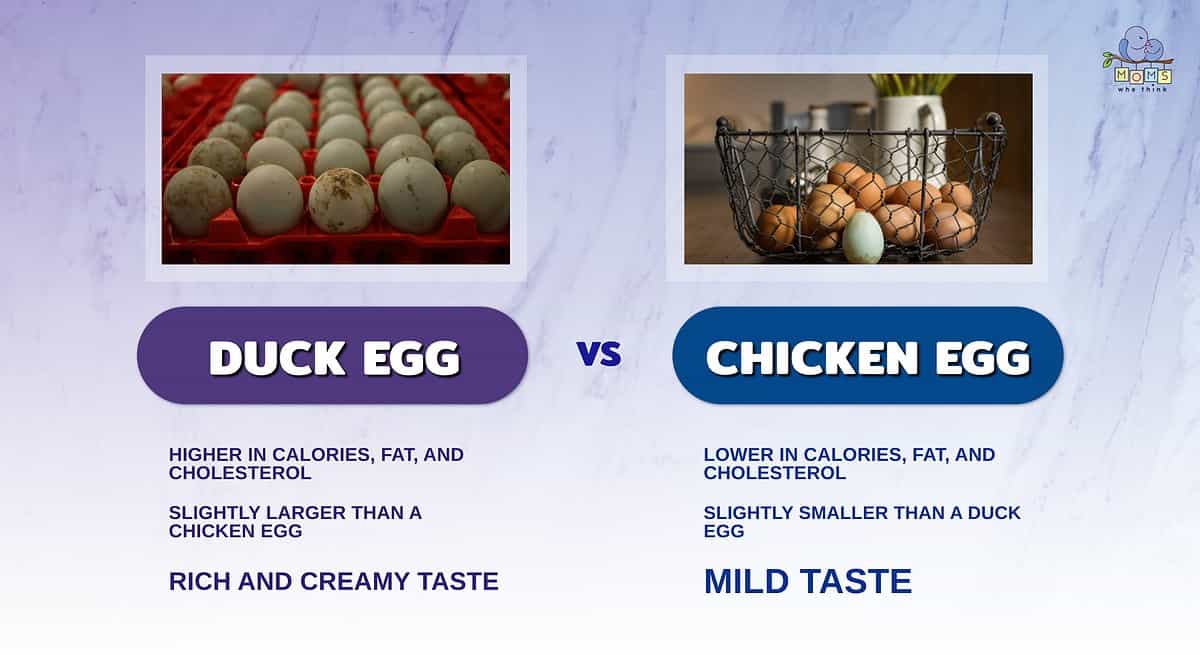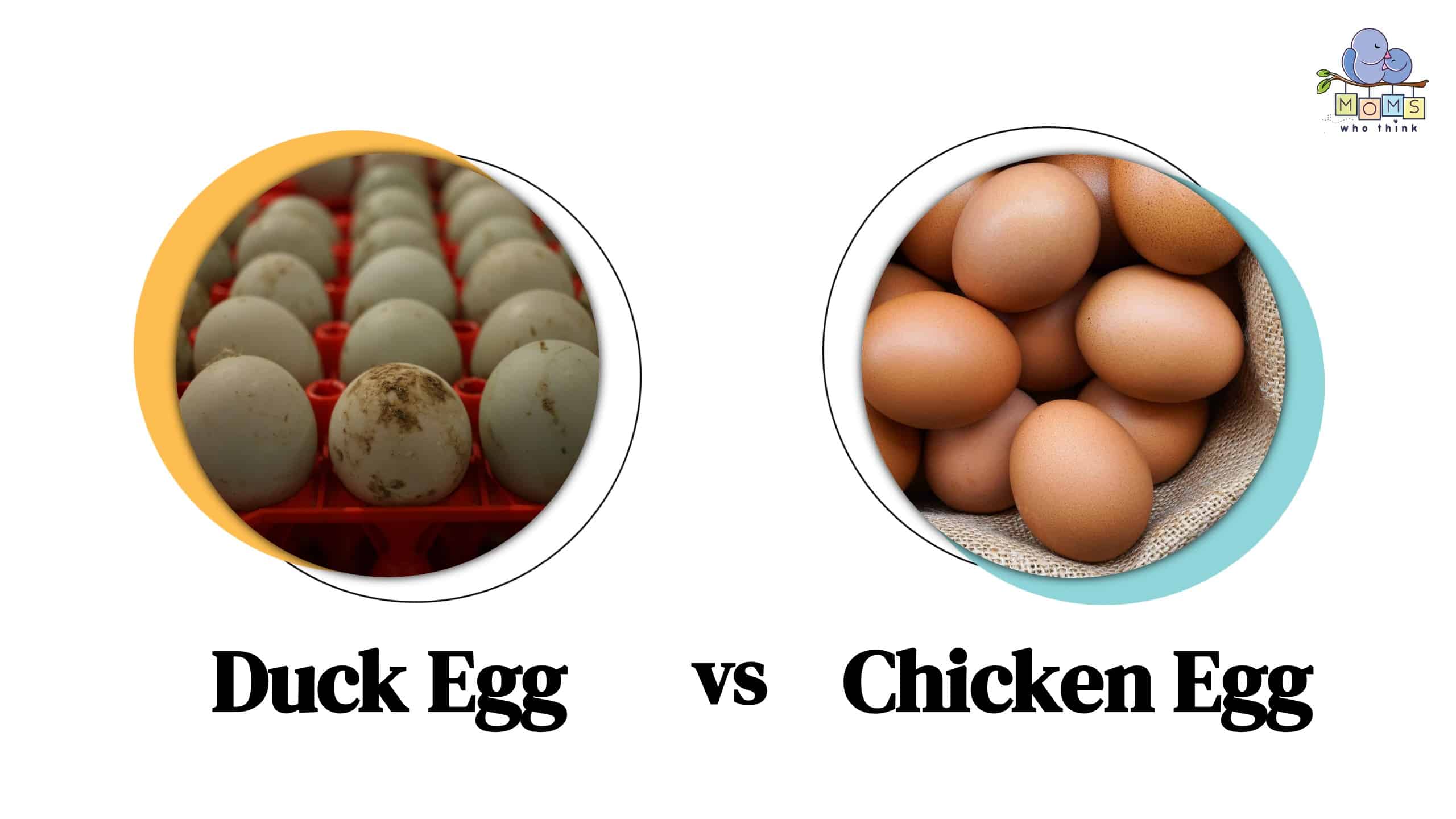When a recipe calls for an egg or two, you probably don’t think twice about what kind of egg they’re referring to. Chicken eggs are the go-to for most people. They’re also typically the only type of eggs you’ll find in the grocery store. Even though they can be a challenge to find, duck eggs are an excellent alternative to chicken eggs, and some might even say they’re better!
If you’ve never tried duck eggs before, you may not know some of the similarities and differences between duck eggs vs. chicken eggs. Let’s look at what makes duck eggs stand out from chicken eggs and which would be best for your next recipe.

Duck eggs and chicken eggs have many differences, including their appearance and size.
©Joshua Kirk/Shutterstock.com
Duck Eggs vs. Chicken Eggs: What Is the Difference?
The primary difference between duck and chicken eggs is that duck eggs are larger, with thicker shells. In addition to this larger size, duck eggs have more yolk relative to egg whites. Nutritionally, dck eggs contain more protein, fat, and cholesterol than chicken eggs.
The flavor of chicken eggs is more mild compared to duck eggs, which have a richer and creamier taste and texture. Also, chicken eggs are more widely available and their mild flavor is preferred for cooking and applications. Let's dive into the differences in more detail.
Size
The average chicken egg weighs 1.7 ounces whereas the average duck egg weighs 2.5 ounces. Even though chicken eggs can reach up to 2.5 ounces, that would be considered a jumbo size egg.
Nutrition
Despite the popularity of chicken eggs, duck eggs are a great alternative and are more nutritious in many ways. Duck eggs have a higher concentration of certain nutrients, like vitamin B12 and omega-3 fatty acids.
Shell and Appearance
Another difference between duck eggs vs. chicken eggs is their shell. Along with the shell of duck eggs being thicker, they’re also a variety of colors. Chicken eggs are typically either white or brown but duck eggs can be green, white, brown, blue, or even speckled. The color of the eggs depends on the breed of the duck as well as the duck’s environment and nutrition.
What Are Duck Eggs?

Duck eggs at a local shop
©Peace-loving/Shutterstock.com
They may be harder to find, but duck eggs are an excellent alternative to chicken eggs. You won’t find duck eggs in most grocery stores because they cost more money to produce and there’s not as high of a demand for them. However, they are often sold in high-end grocery stores, health food stores, and farmer’s markets.
Like chicken eggs, the duck eggs you purchase for consumption are not fertilized, which means the eggs won’t become baby ducklings or chicks. That is unless you’re in the Philippines where a fertilized duck egg, known as a balut, is a delicacy and common street food.
Duck eggs are made up of the yolk, egg white, and egg shell. They have a higher concentration of yolk compared to chicken eggs and are higher in protein. Duck eggs can be fried, boiled, poached, or scrambled like chicken eggs. You can also use them in baking recipes and they often give baked goods a lighter and fluffier texture.
What Are Chicken Eggs?
Chicken eggs are the type of eggs commonly found in stores. They’re used for cooking and baking and are the main event in many popular dishes such as egg salad or deviled eggs. These eggs are laid by hens and on most commercial farms, hens lay eggs without a rooster because the eggs are unfertilized.
Hens can lay up to one egg each day, but not all hens lay an egg every day. It generally takes at least 24 hours for the egg to be produced, and the environment and conditions the hen is living in directly impact their ability to lay eggs consistently.
Chicken eggs, like most other poultry eggs, are a good source of protein and fat. Many of the best nutrients in a chicken egg such as lipids and vitamins come straight from the egg yolk.
Nutritional Value of Duck Eggs vs. Chicken Eggs

USDA nutritional values for duck and chicken eggs
©
Duck eggs and chicken eggs are similar in a lot of ways despite some of the distinct features that make duck eggs stand out. When it comes to nutritional value, there are some differences between duck eggs vs. chicken eggs. Here’s a comparison between the nutritional value of both types of eggs.
| Nutritional Values | Duck egg (100 g) | Chicken egg (100 g) |
| Water | 66.75 g | 76.4 g |
| Protein | 11.96 g | 9.99 g |
| Total lipid (fat) | 18.53 g | 11 g |
| Carbohydrate | 1.36 g | 1.61 g |
| Fiber | 0 g | 0 g |
| Sugar | .87 g | 1.39 g |
| Calcium | 60 mg | 66 mg |
| Iron | 3.59 mg | 1.31 mg |
| Magnesium | 16 mg | 11 mg |
| Phosphorus | 206 mg | 165 mg |
| Potassium | 208 mg | 132 mg |
| Sodium | 266 mg | 145 mg |
| Zinc | 1.32 mg | 1.04 mg |
| Copper | 0.058 mg | 0.059 mg |
| Riboflavin | 0.359 mg | 0.376 mg |
| Selenium | 33.9 µg | 23.5 µg |
| Thiamine | 0.117 mg | 0.04 mg |
| Vitamin A | 205 µg | 161 µg |
| Vitamin B6 | 0.258 mg | 0.134 mg |
| Vitamin B12 | 4.03 µg | 0.76 µg |
| Vitamin D | 1.6 µg | 72 IU |
| Vitamin E | 1.91 mg | 1.15 mg |
Can You Substitute Duck Eggs for Chicken Eggs?
Chicken eggs are the easiest to find when you head to the store for groceries, but if you want to try duck eggs or even own ducks of your own, you might wonder what you can use duck eggs for.
Most of the time, duck eggs can be substituted for chicken eggs. Whether you’re poaching, scrambling, or boiling them, you can cook them the same way you cook chicken eggs. Most recipes aren't going to call for duck eggs but with a similar texture and use, they can be substituted.
Duck eggs do have a larger yolk and lower water content than chicken eggs so keep that in mind when switching them out since you may need to adjust the cooking time. They can also be used in baking recipes and the larger yolk often leads to a fluffier texture in cakes or similar baked goods.

Eggs of all kinds can be beneficial when included as part of a healthy diet.
©Oksana Mizina/Shutterstock.com
Benefits of Eggs
Eggs have many benefits whether you’re using duck eggs or chicken eggs. Let’s take a look at some of the benefits of including eggs in your diet.
Good source of protein
Protein is an essential part of every healthy diet. Your body uses protein as an energy source, and it helps build and repair muscles. Eggs are a good source of protein in your diet and one egg can contain between 6-10 grams of protein depending on the size and type of egg.
May improve maternal nutrition
For pregnant women, nutrition is essential to keeping mom and baby healthy. Eggs are a great addition to the diet of pregnant women and can have many positive effects on maternal outcomes. Even after birth, the choline found in eggs can improve brain health in newborn babies when absorbed through breast milk. Eggs can also contribute to the healthy growth and development of infants.
High in Vitamin D
Eggs are also a good source of vitamin D and a couple of eggs a day can provide up to 9% of your daily value. Vitamin D is what helps your body absorb calcium and phosphorus, and is a necessary part of bone health. The high amount of Vitamin D in egg yolks may help prevent Vitamin D deficiency in adults and children.
Help with weight loss
Since eggs are high in protein, they help you stay full longer. In some studies, this has led to appetite suppression and an overall decrease in calorie intake. When combined together, eggs have been shown to enhance weight loss outcomes.
Duck Egg Recipes
Chicken Egg Recipes
Print
Deviled Eggs
Ingredients
6 eggs
Dash of salt
Dash of pepper
1/4 teaspoon mustard
1 1/2 to 2 1/2 Tablespoons mayonnaise
Paprika
Instructions
1. Hard boil eggs. Cool 10 minutes and remove shells. Cut into halves lengthwise and remove yolk, place yolk into a small bowl.
2. Cream yolk, salt, pepper, mustard and mayonnaise.
3. Put 1/2 teaspoonful into egg whites and garnish with paprika.
- Sausage and Egg Overnight Casserole
- Crock Pot Eggnog Monkey Bread
- Baked Breakfast Scrambled Egg Casserole
- Eggnog Recipes
Takeaway

- Duck eggs are higher in calories, fat, and cholesterol compared to chicken eggs. While this isn't ideal for those on a diet, it does mean duck eggs have a rich flavor.
- Chicken eggs are only slightly smaller than duck eggs. Some chicken eggs can grow to the size of a duck egg, but this would classify the chicken egg as a jumbo one.
- The rich and creamy flavor of a duck egg contrasts the mild and subtly pleasant taste of a chicken egg.
Although chicken eggs are most commonly found in stores, duck eggs are an underrated alternative. Duck eggs and chicken eggs have many similarities as far as their properties and uses. However, duck eggs are considered to be more flavorful and have greater amounts of nutrients such as protein and vitamins.
They may be difficult to find, but duck eggs are usually sold in health food stores and farmer’s markets. If you haven’t tried duck eggs as an alternative to chicken eggs, you may be surprised by their many benefits and delicious flavor.


